Surely, our most unexpected gold medal
This Olympics win was so significant a new expression entered Australian vernacular. Do a Bradbury!
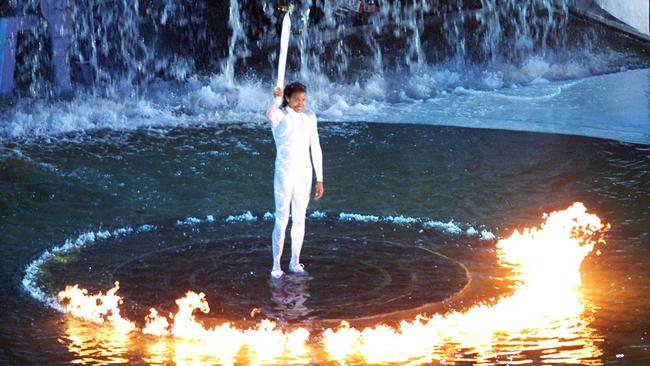
To celebrate this masthead’s 60th birthday we are publishing a sample of six decades of journalism. Today we look at the big sports events of the 2000s.
BLAZING A TRAIL
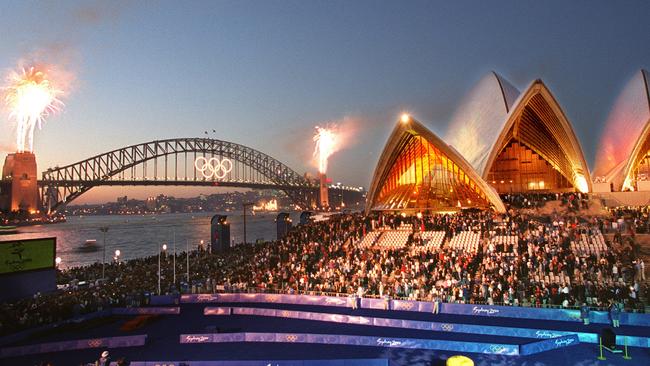
What a magnificent way to celebrate a century of women’s participation in the Olympic Games! And how fitting that Australia, which owes so much to its women athletes, should choose to light the flame this way.
A medley of our greatest female Olympians handed around the torch from its arrival in the Olympic stadium. And for a while, there was a guessing game.
The final task of lighting the cauldron’s flame, which will burn above the Olympic Stadium for the next 16 days, went to a woman who has three times celebrated victories by wrapping herself in the Aboriginal and Australian flags.
The choice of Cathy Freeman to perform this important ritual was bold and inspired. It amounted – at a sensitive moment, when the eyes of the world are on Australia – to a powerful statement of unity and purposeful direction.
There were other remarkable candidates for this role, including all of the women who had a taste of the torch in the stadium last night. For some of them, such a choice would have been seen as a reward, a proper recognition for deeds performed in the past.
Sure, there was obviously an element of the past in the decision to select Freeman, but there was something else – a desire to address the present and the future.
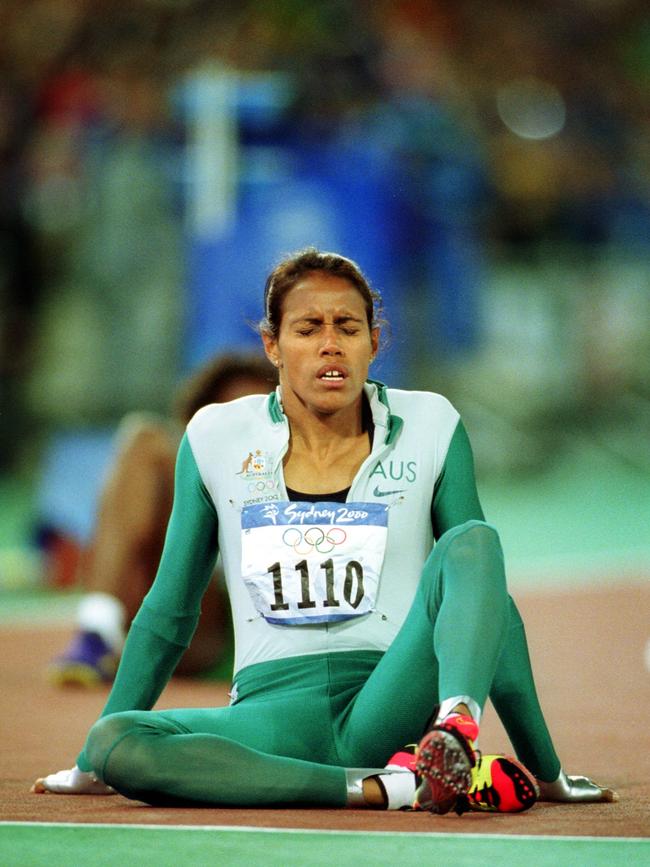
Her choice amounts to a declaration about the kind of country Australia is, and where it is going, coming at the end of a program that emphasised the significance of Aboriginal culture. It amounted to a recognition of a desire for reconciliation.
And there was irony in the fact that Freeman’s own grandmother was a victim of the policy of enforced assimilation – that she will never know the identity of her own great grandmother.
Freeman, the most high-profile athlete of her race since Evonne Goolagong-Cawley, has resisted calls from Aboriginal activists to protest at the Games. She is a balanced, thoughtful woman who is carrying enormous expectations, as she moves towards the contest of her life in the 400m.
She is Australia’s only realistic gold-medal hope on the track and field program.
Betty Cuthbert’s appearance in a wheelchair, guided by Raelene Boyle, received a tremendous ovation. For a few exquisite moments, she was the Golden Girl of the Olympics again.
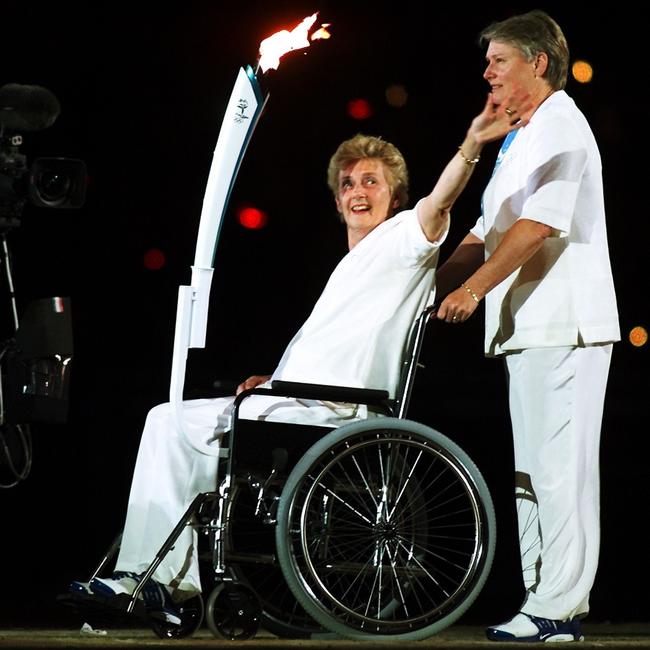
Forget that she is 62 now, and that multiple sclerosis has sapped much of her strength. For me, and for thousands in this crowd last night, she was 18 again and the heroine of the Olympic world.
In my memory, she was streaking along the straight again, jogging hard on her way to three gold medals at the Melbourne Games of 1956.
Without even a glimpse of a kangaroo or a koala, last night’s opening ceremony managed to evoke the essence of Australia. It was truly a joyous celebration of this country’s identity: proud, consistently breathtaking and often funny, even quirky. Most welcome of all, it was free of even the merest smudge of cultural or international cringe.
Bradbury’s tactical triumph
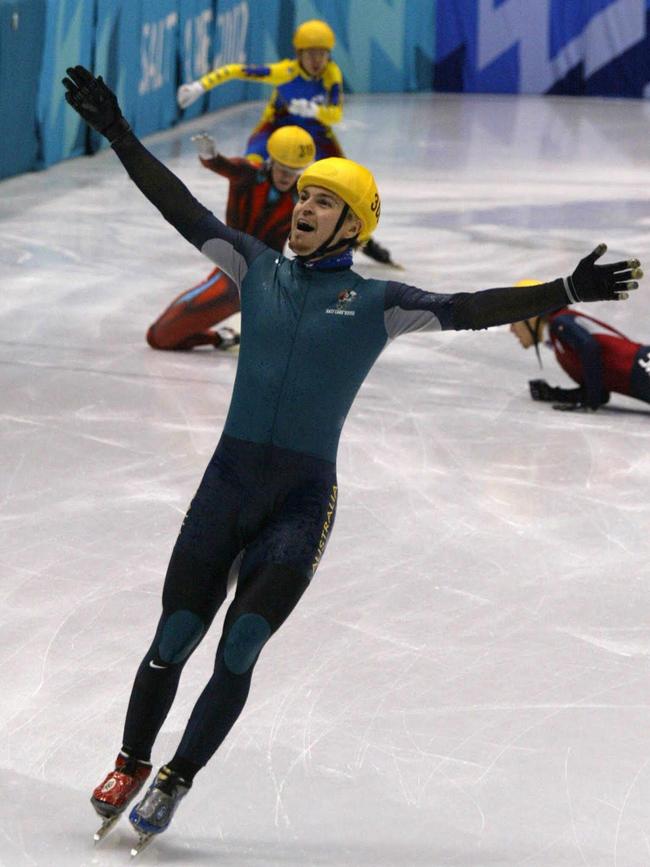
Australia’s first winter Olympic gold medal was won in a race so bizarre as to almost defy belief.
From the moment 28-year-old Steven Bradbury skated onto the ice for the quarter-finals of the men’s 1000m at the short track speed skating arena in Salt Lake City, he was feeling lucky.
Through three rounds of racing, his competitors stumbled, fell and were disqualified around him, allowing him to progress to the final and ultimately one of the most unlikely gold medals in Olympic history.
Australia had previously won only two bronze medals at the winter Games – a short track relay in 1994 (bronze), and Zali Steggall’s bronze in the slalom at the 1998 Games.
Australia’s best speed skater went into last night’s quarter-finals with no expectations.
Three days earlier he had won his heat convincingly but was drawn into one of the hottest quarter-finals that included the American favourite Apolo Anton Ohno and multiple world champion Mark Gagnon of Canada.
With only two men to qualify for the semi-finals, Bradbury’s chances looked dismal.
However, Gagnon was disqualified for impeding another skater, giving third placed Bradbury a free passage to the semi-finals.
Together with coach Ann Zhang, Bradbury agreed on a specific tactic for the semi-final, deciding that he would deliberately skate behind the pack to stay out of trouble in a sport renowned for its thrills and spills.
‘‘I played the same tactics in the semi-finals and the finals, to skate at the back and wait for the accidents to happen – it’s the nature of the sport,’’ he explained.
As he had predicted, the first crash came in the semi-finals. Defending Olympic champion Kim Dong-Sung collided with Chinese Li Jianjun and fell out of the race.
Li and Canadian skater Mathieu Turcotte then crashed on the final bend, allowing Bradbury to sneak through in second place and qualify for the final.
Bradbury decided to continue with the tactics which had favoured him in the semi-finals, and they succeeded beyond his wildest dreams.
As the four men in front of him jockeyed for position on the final bend, the Chinese Li was the first to fall, then Ohno.
Turcotte and Korean Ahn Hyun-Soo collided and scattered across the ice, leaving Bradbury alone to skate to the finish line. Ohno and Turcotte scrambled to the finish line to secure the minor medals.
‘‘I was hoping to win the bronze medal,’’ Bradbury confessed later. ‘‘There are a lot of crashes in short track but to have four guys going down is not commonplace. I had a lot of luck on my side today.
‘‘I won’t take the medal as the result of one-and-a-half minutes of a race, but of the last decade I have put in and as a reward for effort.’’



To join the conversation, please log in. Don't have an account? Register
Join the conversation, you are commenting as Logout